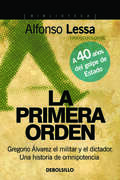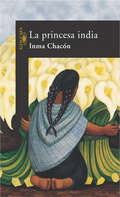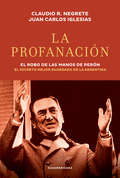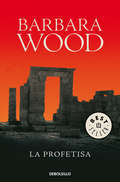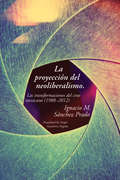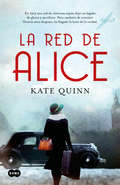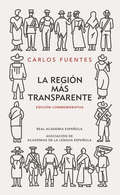- Table View
- List View
La primera guerra de Hitler
by Thomas WeberLa revelación de la vida privada y pública de Hitler y de la I Guerra Mundial basada en una investigación sin precedentes. Hitler mantenía que sus años como soldado en la I Guerra Mundial fueron los más influyentes de su vida. Sin embargo, y pese a las más de seis décadas transcurridas desde su muerte, su etapa en el Frente Occidental seguía hasta ahora rodeada de misterio y presunciones infundadas. La primera guerra de Hitler desvela por primera vez la verdadera experiencia del futuro líder nazi durante el conflicto. Haciendo uso de documentación inédita y de testimonios de sus compañeros de regimiento, Thomas Weber presenta una esclarecedora visión de la vida privada y pública de Hitler, muy alejada del mito que él mismo creó tras su llegada al poder. Este libro revela a un Hitler encargado de tareas de retaguardia, rechazado por los soldados del frente y en el que sus superiores detectaron ausencia de «cualidades delíder»; un personaje que permaneció inseguro de sus ideas hasta el final de la guerra y que ocultó, exageró y deformó sus vivencias a lo largo de su estudiada carrera. ¿Fue Hitler meramente un producto de su tiempo o una anormalidad que se escapa a toda previsión? La polémica y original obra de Weber arroja además luz sobre este interrogante que sigue desafiando a los historiadores y cuestiona la creencia unánimemente aceptada de que la I Guerra Mundial fue la experiencia crucial de su formación política e ideológica y el origen del camino que condujo de forma natural al nazismo. Reseña:«Weber altera sustancialmente nuestra visión de uno de los personajes más estudiados del siglo XX.»Norman Stone, Wall Street Journal «El título de este libro es preciso y completo, pero no da cuenta del alcance y la importancia de su contenido. Magnífico e impresionante.»Times Literary Supplement «Revelador y apasionante. Mediante unconcienzudo estudio, desmonta lugares comunes, tópicos y clichés.»Jacinto Antón, El País «Una exploración bien documentada que plantea interesantes preguntas sobre las creencias y actitud de Hitler durante la Primera Guerra Mundial.»Ian Kershaw «Fascinante de principio a fin. Una obra de referencia, tan reveladora como atrapante.»The Canada Post «¿Fue Hitler un soldado valiente durante la Primera Guerra Mundial? Thomas Weber desmonta todos los tópicos en torno al führer.»Eduardo González Calleja, ABC «Un estudio innovador y valioso basado en una hábil investigación. Revelador y accesible.»The Spectator «El joven historiador escudriña los cuatro años de Hitler como soldado durante la Primera Guerra Mundial para arrojar alguna luz nueva sobre el perfil de este personaje inevitable en las pesadillas de los europeos.»Víctor Amela, La Vanguardia
La primera orden: Gregorio Álvarez el militar y el dictador. Una historia de omnipotencia
by Alfonso Lessa"Una investigación que retrata la personalidad del general (r) GregorioÁlvarez y reconstruye los pasos que, con una vocación políticainfrecuente entre los militares, lo convirtieron en el general máspoderoso de la historia uruguaya reciente." Una investigación integral y rigurosa, con la perspectiva que merece uncapítulo crucial de la vida política del país. Lessa se nutrió deentrevistas a referentes políticos y militares de la época, hombrescercanos a Álvarez y otros que lo enfrentaron, y reunió valiososdocumentos muchos inéditos o casi desconocidos que se rescatan en estapublicación. El apetito de poder del general Gregorio Álvarez, su sordadisputa con Bordaberry, la lucha por la conducción económica en ladictadura, los golpes dentro del golpe, las conversaciones con elenemigo, su plan político, los intentos de asesinarlo, su obsesión porlos dirigentes políticos y en particular por Wilson, el papel de sugobierno y de Uruguay en la guerra de las Malvinas, las autocríticasdespués del No del 80, el peso psicológico de los caceroleos, el pactodel Club Naval a sus espaldas, las negociaciones secretas y la visita delos reyes de España son algunos de los puntos más relevantes de estainvestigación imprescindible.
La princesa del East End (Secretos de alcoba #Volumen 3)
by Christine Cross Anne Marie CrossÚltima entrega de la irresistible trilogía Secretos de alcoba. Ella lo cautivó desde su primer encuentro, y él se prometió que, algún día, esa mujer sería suya. Ella era rebelde. Él había prometido conquistarla. Un matrimonio por conveniencia ligará sus destinos y hará surgir la pasión y el amor, a pesar de los peligros. En el peligroso mundo de los bajos fondos londinenses, Camilla Lambert se ha ganado un hueco en el corazón de las prostitutas y de los niños de la calle. En su deseo por ayudarlos, no encuentra otro camino que el de un matrimonio por conveniencia. Charles siempre ha estado enamorado de Camilla. Ahora que se ha convertido en su esposa, solo tiene que conquistarla. Pero ¿cómo conquistar a alguien que no cree en el amor? Juntos iniciarán un camino difícil, en el que la pasión y la ternura lograrán abrirse paso en sus corazones. Sin embargo, los planes de ambos y su propio matrimonio se verán amenazados por un peligro oscuro y misterioso que acecha en los bajos fondos.
La princesa en la sombra (Trilogía Taj Mahal #Volumen 3)
by Indu SundaresanUn amor imposible y una lucha fratricida por el poder en la corte imperial india del siglo XVII. 17 de junio de 1631. La bella Aryumand ha muerto al dar a luz. A su lado la lloran su marido, el emperador mogol Sha Yahan, y la hija mayor de ambos, la princesa Yahanara. Con solo diecisiete años, Yahanara debe asumir las responsabilidades de una emperatriz sin serlo: acompañar a su padre en el duelo, tomar las riendas del harén, administrar las enormes riquezas de su madre y atemperar los ánimos de sus hermanos, que prepararán la sucesión cada uno por su cuenta. Una sola cosa alegra los días a Yahanara: las atenciones que le depara el apuesto Nayabat Jan. Sin embargo hay quien, aconsejado por las malas lenguas, no ve con buenos ojos su relación con este noble venido del norte, porque ella debe gobernar en la sombra mientras Sha Yahan dedica su tiempo y los recursos de su imperio a construir el mayor homenaje al amor de la historia de la humanidad, el Taj Mahal. La crítica ha dicho...«Rivalidades entre hermanos, luchas por el poder, engaños, amores no correspondidos y alianzas secretas: un verdadero festín.»Elle
La princesa federal
by María Rosa LojoLa novela emblemática sobre Manuelita Rosas, instalada entre loslectores como una obra clave para la comprensión de un mito delimaginario nacional más allá de los clichés y las fáciles antinomias. En 1893 Gabriel Victorica, joven médico de familia federal, llega aEuropa con un cuaderno punzó para entrevistar en su exilio londinense auna legendaria y ya anciana Manuela Rosas, que irá evocando para élsombras y esplendores.El otro lado de su historia se oculta bajo las tapas rojas de esecuaderno donde Pedro de Angelis, erudito napolitano al servicio deRosas, ha escrito sus más secretos pensamientos sobre el Gobernador y la«Niña». ¿Ha sido Manuela víctima o cómplice de su padre, hada compasivao hábil política? El lector tiene la última palabra.«Una escritura bella y compleja, una coartada estética para penetrar unenigma y encontrar solo preguntas». Elsa Drucaroff, revista El PlanetaUrbano
La princesa india
by Inma ChacónUna historia de amor entre el choque de culturas. «A veces los dioses se interponen entre los hombres que están por venir y las mujeres que los han de traer.» En la aventura del nuevo mundo una joven azteca con misteriosos poderes y un capitán del ejército de Hernán Cortés verán unida su suerte por el azar y el destino. Los dos se embarcarán hacia España, y juntos iniciarán una lucha, repleta de riesgos y peripecias, por conquistar el amor y la verdad. Auténticos náufragos de ese destino, entrelazan sus vidas de una orilla a otra de la historia, entre la guerra y la distancia, entre la América del Imperio azteca y la España de la Inquisición. La princesa india combina el relato de aventuras con la crónica de Indias, y en un acercamiento lírico y sentido a las culturas indígenas, Inma Chacón nos regala un mosaico de géneros literarios que es a su vez un homenaje a nuestra literatura clásica.
La princesa y el comandante
by Sandra Bree¿Podrá el cariño de Jade curar la sed de venganza de Diego? Jade, nacida del sultán y de una esclava inglesa, vive en el palacio de su padre alejada de los privilegios de su nacimiento, ejerciendo de acompañante de la hija favorita del emperador, Corinna, quien siempre la trató como a una hermana. Al llegar a las prisiones del alcázar una joven española que ha sido comprada, se compadece de ella y la cuida, ganándose el odio de su tía, la hermana del emperador turco. Cuando en una escapada secreta de su hermana para ver a su amado, son secuestradas, Jade se hace pasar por la princesa y es llevada al galeón de un español que ha llegado a Turquía con sed de venganza y no dudará en utilizar a Jade para conseguirla. Para Diego Salazar ha llegado la hora de casarse con su prometida y embarcarse en la Gran Armada, pero el secuestro de su joven hermana por los otomanos acelera su salida de España como capitán del Destructor Azul bajo bandera pirata para arribar cuanto antes a costas turcas. Allí, secuestra a la hija del sultán para proponer un intercambio. Pero, durante los días que la tiene en su nave, descubre a una mujer muy diferente a la que esperaba; hermosa y amable, hace que su odio se tambalee y que dese que las cosas fueran de otro modo, en especial cuando la pasión se desborda entre ellos. ¿Qué es más fuerte, el odio a los enemigos o el amor verdadero?
La profanación: El robo de las manos de Perón. El secreto mejor guardado de la Argentina
by Juan Carlos IglesiasLa investigación más exhaustiva sobre el hecho que en 1987 conmovió al país y al mundo: la profanación de la tumba de Juan D. Perón, y el corte y la desaparición de las manos de su cadáver. El 1 de julio de 1987 la Argentina fue sacudida por la noticia de la mutilación del cadáver de Perón en el Cementerio de la Chacarita: sus manos habían sido robadas. Al estupor le siguieron las hipótesis: se las habían llevado para cobrar un rescate millonario o para acceder con sus huellas digitales a cuentas en Suiza; el ultraje había sido parte de un rito masónico en venganza por pactos no cumplidos por el ex presidente, o un mensaje de la poderosa logia Propaganda Due de Licio Gelli o una ceremonia esotérica de otro origen. El gobierno de Alfonsín sostuvo que se trataba de un ajuste de cuentas entre líneas internas del peronismo, y éste contraatacó diciendo que era una campaña del radicalismo para perjudicarlo en las elecciones de gobernadores de ese año. Pero el hecho no quedó ahí: el juez del caso, Jaime Far Suau, fue asesinado, y dos testigos clave fallecieron en circunstancias sospechosas; además, el comisario a cargo de la investigación sobrevivió milagrosamente a un disparo a quemarropa y al poco tiempo fue pasado a retiro sin justificación. Claudio R. Negrete -periodista- y Juan Carlos Iglesias -abogado que integró el equipo de Far Suau- investigaron durante años para escribir este libro, que sigue a fondo cada una de las pistas y reconstruye la historia completa de un hecho impune que la ficción más descabellada no se hubiera atrevido a imaginar, y cuya conclusión, a tres décadas de sucedido, es "nadie sabe; nadie fue".
La profetisa (Bestseller/debolsillo Ser. #Vol. 458)
by Barbara WoodCatherine ha hecho un descubrimiento arqueológico que podría hacer tambalear los cimientos de la cultura occidental. En una carrera contra el Apocalipsis, la joven deberá enfrentarse al FBI, al Vaticano y a un siniestro millonario para averiguar toda la verdad. Diciembre de 1999, Desierto del Sinaí: la arqueóloga Catherine Alexander encuentra seis papiros escritos en el siglo I d.C., en los que se menciona el nombre de Jesús y que contienen unas revelaciones inquietantes, de un valor histórico incalculable. Pronto se propaga la noticia del hallazgo, y desde ese mismo momento a Catherine no le quedará otro remedio que huir. Con la ayuda de otro arqueólogo y de un sacerdote con el que establece una ambigua relación, emprenderá una carrera contrarreloj para tratar de preservar los manuscritos de la codicia de gobiernos, coleccionistas sin escrúpulos y la propia iglesia, que ve tambalear sus propios fundamentos. Reseñas:«Wood es un portento cuando se trata de conjugar acción y romance, porque consigue que ambos destaquen y que mantengan su fuerza por igual.»Kirkus Reviews «Bárbara Wood es una artista.»Washington Post Book World «[Barbara Wood es] una autora consumada.»New York Times Bestselling Author
La promesa (Los caballeros del tiempo #Volumen 3)
by Jimena CookLlega la última entrega de la trilogía «Los caballeros del tiempo», iniciada en La elegida, con la historia de Aldan y Mónica. Un amor capaz de traspasar la línea del tiempo y una promesa que nunca será olvidada. «Ahora puedo sentirte... ¡Vuelve a mí!» Mónica supo desde el primer momento que no había sido un sueño. Él había irrumpido en su vida de repente, sin previo aviso, para protegerla y ayudarla a cumplir una misión. Una pitonisa, una promesa hecha hace muchos siglos y una carta de un caballero de otra época irrumpirán en su vida hasta llegar a obsesionarla y forzarla a buscar respuestas a todas las incógnitas. Aldan Macrae se resiste a realizar el deber encomendado por su padre: acompañar a un muchacho inglés hasta la abadía de Kinloss. Ese joven representa la esperanza para las Tierras Altas, pero el guerrero no considera que sea un cometido para el jefe del clan Macrae. Su actitud cambia cuando descubre que bajo esa apariencia de niño se esconde una bella dama, Katherine Dunnottar, una joven misteriosa que guarda un gran secreto. ¿Mónica o Katherine? ¿Pasado o Presente? Ella tendrá que elegir, pero antes deberá vencer sus miedos y peligros que desde el siglo XI la persiguen. Los lectores de la trilogía han dicho...«Me leí el primer libro de la triología y me encanto todo lo sucedido entre Elizabert y Kimbal y el segundo libro con Ana y Korva me ha gustado con mucho amor, aventuras, intrigas etc. Espero que llegue pronto la tercera entrega.» «Ya me encantó el primero de esta serie y estaba deseando poder leer este. Y no me ha decepcionado. Me ha gustado muchísimo la historia y estuve atrapada desde el primer momento. Lo leí rapido porque no podía parar. Como en todos sus libros, Jimena Cook me ha hecho viajar.» «De verdad, hacía mucho que no leía dos novelas realmente lindas y con una gran historia, gracias por estos dos libros de "Los Caballeros del Tiempo".»
La promesa de lady Wright (El destino de los Wright #Volumen 6)
by Arlene SabarisPor las grietas de una promesa rota se colará el amor entre dos corazones más parecidos de lo que están dispuestos a admitir. Lady Elisabeth Wright es la más pequeña y consentida de Marton Hall. La vivaz jovencita no está acostumbrada a recibir un "no" como respuesta y al llegar su temporada no puede pensar en otra cosa que en lucir los muchos vestidos nuevos que han sido preparados para ella, y en que por fin conocerá a aquel que la desposará en la más lujosa de las bodas.Sin embargo, eventos inesperados la llevarán a pasar unos meses con sus familiares en España y a pesar de que al principio le resulta una injusticia marcharse justo cuando la solicitan los más agradables pretendientes, pronto descubrirá que aquel viaje es todo lo que necesita. El reencuentro con un viejo rival de su infancia le hará cuestionarse la promesa que se había hecho a sí misma de casarse en la más ostentosa de las ceremonias con el más apuesto y rico noble de Londres, quienquiera que sea. Pronto Elisabeth se debatirá entre aquello que considera perfecto y un nuevo sentimiento que nace en su corazón o que quizás ha estado allí desde siempre. El destino de los Wright nos traslada en primer lugar a la Inglaterra de la época de Regencia. Nos lleva de los grandes bailes de Londres a la campiña inglesa. También a las Tierras Altas de Escocia, sin que falte un paseo por España. Todo siguiendo las vidas de la familia Wright cuyo legado perdurará en el tiempo.
La promesa de los abedules
by Enara de la PeñaSi eres una apasionada de Anna Karenina, Anastasia y el Doctor Zhivago, este es tu libro. Dos historias de amor en la ciudad de San Petersburgo, en 1880, a las puertas de una revolución que cambiará el mundo. San Petersburgo, 1880. Forzada a casarse, la princesa Nadia Volkonskaya empieza una nueva vida en el hogar de un hombre que ha pasado más tiempo en América que en su rusia natal. Un hombre que puede ser su condena o su liberación. Larissa es una revolucionaria, una mujer dispuesta a romper con los moldes del mundo que le rodea, incluso si debe hacerlos estallar. Cansada de la injusticia, se une a la Voluntad del Pueblo con un plan que destruirá sus grilletes. El príncipe Yuri Khilkov es la conexión de estas dos mujeres. Un príncipe perdido, en busca de un amor de infancia que anhela desde su marcha mientras recupera el honor del apellidofamiliar. El conde Lev Golitsin y el príncipe Nikolay Volkonsky no se soportan. Un vividor y un denigrado héroe de guerra que deberán colaborar para que sus amigos tengan el final feliz que a ellos se les niega. Si, finalmente, villa Betulia permite a sus habitantes alcanzar la felicidad.
La promesa del ángel
by Frédéric LenoirUna roca en la costa normanda azotada por las tempestades, un lugar de cultos primitivos celtas que fue santificado por los primeros cristianos: el Mont-Saint-Michel todavía no ha revelado todos sus secretos. A principios del siglo XI, los constructores de catedrales erigieron en honor al arcángel san Miguel, guía de las almas al más allá, una gran abadía. Mil años más tarde, Johanna, una joven arqueóloga apasionada por la Edad Media y encargada de llevar a cabo excavaciones en la célebre abadía benedictina, se encuentra prisionera de un enigma en el que pasado y presente se unen de forma extraña. Muertes rituales, secretos milenarios, amores prohibidos del pasado que renacen impetuosos en el presente. La joven arqueóloga debe recorrer un camino de vuelta al ayer, que la sitúa ante una historia que ha perdurado en el tiempo esperando su desenlace final, mientras una voz en sus sueños le repite: «Hay que cavar en la tierra para acceder al cielo». La crítica ha dicho...«Una novela apasionante, con las dimensiones de una catedral cuya arquitectura y sutileza se revelan a medida que nos acostumbramos a la penumbra medieval, y mientras su heroína excava en sus sueños y en las entrañas del Mont-Saint-Michel. En la línea del bestseller de Ken Follett Los pilares de la tierra.»Le Figaro
La promessa del visconte (Castle Brides #1 #1)
by Collette CameronLui aveva intenzione di rovinarla… ma si è innamorato. Ian è un lord vendicativo. Noto per il suo atteggiamento deciso e l’onore inflessibile, parte per Londra con un intento ben preciso: la rovina irreversibile e permanente della seduttrice che ha causato la morte di suo fratello. Tuttavia, al posto di una sirena senza scrupoli, trova una bellezza dai capelli d’ebano e la voce gentile. Contro ogni pensiero razionale, si ritrova irresistibilmente attratto dall’ultima donna in Inghilterra di cui avrebbe dovuto innamorarsi. Evangeline è una donna coraggiosa di sangue zingaro. Sopporta lo sdegno dell’alta società e le numerose proposte indecenti con grazia e contegno. Ma quando un lord testardo inizia a pianificare la sua rovina, dice addio alla sua buona educazione. A peggiorare la situazione, lui inciampa nella sua stessa trappola, forzando entrambi a un matrimonio che nessuno dei due avrebbe mai voluto… o forse sì?
La proyección del neoliberalismo: Las transformaciones del cine mexicano (1988–2012)
by Ignacio M. Sanchez PradoCavernosa, usualmente fría, siempre oscura, con un ligero olor a palomitas de maíz en el aire: la experiencia de ir al cine es universal. No es menos intensa en México, donde la experiencia ha evolucionado de formas complejas en años recientes. Películas como Y tu mamá también, El Mariachi, Amores perros y las obras de los paradigmáticos Guillermo del Toro y Salma Hayek, reflejan mucho más un renovado interés por el cine en México. En La proyección del neoliberalismo, Ignacio Sánchez Prado explora precisamente los eventos que tuvieron lugar en la industria del cine mexicano durante las últimas décadas. Lejos de ser una simple historia del periodo, La proyección del neoliberalismo examina cuatro aspectos esenciales de las transformaciones ocurridas en la industria del cine mexicano: la caída del nacionalismo, un nuevo enfoque en audiencias de clase media, la redefinición del concepto de cine político y el impacto de la globalización. Este análisis incluye a directores y películas que han alcanzado notoriedad internacional o relevancia en la construcción de un mercado nacional. La proyección del neoliberalismo expone las consecuencias de una industria del cine forzada a encontrar nuevas audiencias entre la clase media mexicana para poder alcanzar el ansiado éxito económico y la aprobación cultural.
La pérdida de El Dorado
by V. S. NaipaulEl Premio Nobel de Literatura, V.S. Naipaul, nos cuenta en tono de crónica la pequeña y gran historia de su isla natal: Trinidad. V.S. Naipaul nos cuenta de modo magistral la pequeña gran historia de su isla natal, Trinidad, que desde los tiempos de la Conquista fue punto de partida para las expediciones españolas en busca de la mítica Ciudad de Oro y territorio de combate para las ambiciones coloniales de Inglaterra, que no se detendría hasta hacerse con el poder en la zona aprovechando las guerras de independencia de las colonias españolas. La pérdida de El Dorado es una novela con tono de crónica y el pulso dramático de una tragedia de Shakespeare. Reseña:«Hay algo inexorable, al filo del fatalismo, en algunas páginas de Naipaul. Entre tantas cosas, sus libros nos enseñan que no existen causas fáciles y que las decisiones morales no se compran.»Valentí Puig
La quintaesencia de la vida
by Marina De ChateaubriandEsta obra, que al igual que las anteriores pretende ser un mensaje de paz y una oda a la libertad y a la tolerancia, va dirigida a todos los pueblos del mundo sin importar su credo, raza o religión; pero en especial a esa juventud nueva que está surgiendo, cuyo amor por la humanidad y sus deseos de comprender y conocer son más grandes que su miedo al cambio, que tiene otros valores, otras motivaciones, que da más importancia a las relaciones sociales porque ha comprendido que los seres humanos no son simples objetos, que compartir es más importante que poseer y que el individualismo o el egoísmo ciego solo nos llevan a nosotros y a toda la humanidad a su propia destrucción. <p><p> A toda esa juventud que aunque no haya encontrado aún palabras para expresarse, y su enorme energía no haya encontrado cauce por el que discurrir, posee en sus manos el arma más poderosa que existe, la única que puede salvarnos, el amor, La quintaesencia de lavida, la única fuerza capaz de salvar y regenerar el mundo restaurando esos lazos rotos que desde la Torre de Babel, cuando el espejismo del ego se apodero de nosotros, nos hizo olvidar que todos somos hermanos. <p><p>Y a todos mis queridos lectores quiero agradecer con esta nueva obra la fidelidad y el apoyo que me habéis brindado en las anteriores, espero no defraudaros y que podamos seguir mucho más tiempo juntos en este viaje sin retorno hacia ese mundo nuevo que tenemos que forjar entre todos, ese mundo que todos merecemos, simplemente por ser hijos de un mismo y único Dios.
La ragazza di Findley
by Arianna Giorgi Suzan TisdaleAveva conquistato il suo cuore senza neppure provarci... e lui poteva solo sperare di riuscire a conquistare quello di lei. Quando Findley McKenna ritorna da Maggy Boyle, dopo aver combattuto contro gli inglesi, per offrirle di vivere nel suo clan, trova solo morte e distruzione anzichè la giovane vedova che gli aveva rubato il cuore. Con nient'altro che la speranza, il suo cuore di highlander, e un lembo di stoffa insanguinata a cui aggrapparsi, Findley giura che troverà Maggy e i suoi figli, non importa ciò che dovrà affrontare. Come può lei riporre la sua fiducia o il suo cuore nelle mani di un uomo che conosce appena e mantenere la sua libertà e i suoi segreti al sicuro? Maggy ha molti segreti. Segreti che, se scoperti, le distruggerebbero la famiglia. Temendo di essere costretta a un altro matrimonio senza amore, Maggy riesce a nascondere la sua identità e la sua famiglia per tre lunghi anni. Ma quando la sua casa viene distrutta e il suo figlioletto rapito, quei segreti cominciano a venire a galla e a rappresentare una grave minaccia. Come può affidare il suo futuro e quello dei suoi figli a Findley McKenna, un uomo che conosce a malapena? E cosa penserebbe lui se conoscesse la verità?
La razón para rechazar al señor Foster (Los irresistibles Beau #Volumen 6)
by Ruth M. LergaCuando los anhelos del corazón se enfrentan al amor por la familia, el sufrimiento parece estar garantizado. ¿Cómo escoger cuando ambas elecciones duelen tanto? Lady Sarah Beaufort tiene una vida de ensueño: unos padres que la adoran, un hermano que daría la vida por ella y un montón de divertidos primos. Su mayor deseo es casarse ese año y formar una familia como la suya, llena de amor y de gente. Así que no puede permitirse casarse con un americano que vive al otro lado del Atlántico, por lo que lo mejor es alejarlo para siempre. Martin Foster es un rico empresario de Boston que está pensando en abrir un imperio financiero en Inglaterra, por lo que pide consejo a un viejo conocido de su padre, el marqués de Denver, quien lo invita a Londres para el debut de su hija y presentarle en la fiesta a toda la aristocracia. Pero cuando conoce a lady Sarah se olvida de sus negocios y se marca un único plan: convertirla en su esposa. No cuenta con el peor de los rechazos; la joven no es tan dulce como parece, sino una inglesa clasista que considera a los americanos personas de segunda clase. Tal vez deba darle una lección a la marquesita. ¿Qué los separa en realidad, la diferencia de clases o la diferencia de países? ¿Y qué los une verdaderamente, la pasión o el amor?
La rebelión de Las Cañadas: Origen y ascenso del EZLN
by Carlos Tello DíazLa rebelión de las Cañadas es un libro que documenta el levantamiento del EZLN, uno de los sucesos más emblemáticos de la historia de México a finales del siglo XX. Edición actualizada de un bestseller que generó fuertes reacciones y es hoy un clásico del tema. La rebelión de las Cañadas narra la historia de los indígenas que protagonizaron el levantamiento que estalló en 1994 en Chiapas. Describe las causas que los obligaron a dejar las fincas de Ocosingo, para colonizar la Selva; su relación con la diócesis de San Cristóbal, por medio de los catequistas; su encuentro con la organización político-militar de la que surgió el EZLN, las Fuerzas de Liberación Nacional. El libro, sólidamente documentado con los testimonios de los protagonistas del levantamiento, un bestseller en el momento de salir, es hoy un clásico del tema. El texto de Tello Díaz, publicado por primera vez hace ya cerca de veinte años, fue comentado entonces por Héctor Aguilar Camín con estas palabras: "Carlos Tello Díaz ha emprendido en este libro la más sencilla y la más difícil de las tareas en relación con el alzamiento de Chiapas: reconstruir los hechos, poner fechas y causas a los acontecimientos, nombres y rostro humano a las personas, instituciones, comunidades y movimientos que fraguaron la rebelión. Tello Díaz ha devuelto esa rebelión a la historia para sacarla de la mitología".
La rebelión de las audiencias: De la televisión a la era del trending topic y el like
by Jenaro VillamilLa rebelión de las audiencias es una obra indispensable para entender cómo la convergencia tecnológica puso en jaque a la estructura abusiva del poder mediático en México. En menos de una década pasamos del imperio del rating al dominio del mundo hiperconectado por medio de empresas como Google, Facebook, Twitter, Apple o Netflix. La televisión ya no nos gobierna. Como explica Jenaro Villamil en este notable análisis de los medios de comunicación, el Big Brother orwelliano de la pantalla televisiva se desplazó al de la pantalla telefónica y los dispositivos móviles, pero con un sutil y riesgoso cambio de ecuación para las élites: los vigilados pueden vigilar, las audiencias pueden producir contenidos, los ciudadanos pueden reclamar sin mediación. La conectividad y la interacción han convertido la galaxia comunicacional en un nuevo y complejo sistema con posibilidades aún inciertas. La rebelión de las audiencias aporta elementos de discusión teórica y descripción periodística de los fenómenos televisivos y digitales, hace una revisión histórica desde el punto de partida hasta las últimas reformas legales en materia de telecomunicaciones, y ofrece además un acercamiento a las claves del mundo de las redes sociales y el homo zapping. En palabras del autor: "El 80% de las audiencias que se informan a través de medios digitales son audiencias que están en franca rebelión contra la línea informativa y de entretenimiento de Televisa, y ésta ya no tiene credibilidad."
La rebelión de un beso
by Arlene SabarisLa búsqueda desesperada de una joven condesa viuda que anhela el único privilegio que le ha sido negado: el verdadero amor. Una historia de rebelión y privilegios, de pasiones secretas y amores clandestinos. Angelique Saint-Hilaire consumó su matrimonio por contrato al cumplir los dieciocho años, pero poco tiempo después, cuando enviudó del conde Bastien de Valette, heredó su título y una fortuna que le daban privilegios a los que ella no renunciaría fácilmente. La hermosa joven francesa estaba decidida a casarse de nuevo, pero solo si un amor verdadero conquistaba su corazón. Mientras se gestaba la revolución en la colonia francesa de Saint Domingue y el peligro de la rebelión se propagaba por toda la isla, Angelique escribía a escondidas, con desafiante rebeldía, sobre los derechos de las mujeres y la importancia de la libertad y se debatía entre los pretendientes que la asediaban por su fortuna, los que se desvivían por su belleza y el único que, con sus cartas, alguna vez la hizo dudar de todo aquello de lo que creía estar segura. Esteban García, primogénito del gobernador de la isla, estaba prometido en matrimonio a su prima desde que ambos eran niños, pero cada fibra de su ser se estremecía cuando pensaba en Angelique, la condesa que lo había conquistado y que no era más que una imposible y desgarradora obsesión para él, ahora que su inminente boda se llevaría a cabo ante la presencia de las personas más importantes de la sociedad. Esteban verá cómo se esfuma la posibilidad de ver correspondido su oculto amor. Angelique sufrirá su desamor siendo su único refugio la tinta y el papel. Una apasionante historia donde el amor pone a prueba todas sus promesas.
La red de Alice
by Kate QuinnLA NOVELA HISTÓRICA DEL AÑO En 1915 una red de valerosas espías dejó un legado de gloria y sacrificio. Pero también de traición. Treinta años después, ha llegado la hora de la verdad. 1947. La joven americana Charlie St. Clair está embarazada, soltera y a punto de ser expulsada de su muy decente familia. Mientras su mundo se viene abajo, su única ilusión es la débil esperanza de que su amada prima Rose, que desapareció en la Francia ocupada por los nazis durante la Segunda Guerra Mundial, siga viva. 1915. Un año después del estallido de la Gran Guerra, Eve Gardiner está deseando unirse a la lucha contra los alemanes, así que no duda un instante cuando es reclutada como espía de la organización clandestina conocida como «la red de Alice». Tres décadas más tarde, obsesionada por la traición que destruyó la red, Eve pasa sus días entre botellas de alcohol encerrada en su ruinosa casa de Londres. Hasta que una joven americana aparece en su puerta pronunciando un nombre que Eve no ha escuchado desde hace décadas y embarcada en una misión: averiguar la verdad sin importar a dónde conduzca. Heroísmo, amor y suspense en una apasionante novela inspirada en el episodio histórico real de la red de mujeres espías que salvó a más de mil soldados de la muerte. **Más de 1.000.000 de ejemplares vendidos **En las listas de best sellers de The New York Times y USA Today **Finalista en la categoría de Mejor Novela Histórica de los Premios Goodreads 2018 **Número 1 en ficción histórica para el Globe and Mail **Uno de los mejores libros del año para la National Public Radio de EEUU **Seleccionado para el Club de Lectura de Reese Witherspoon **Entre las novelas históricas del año para BookBub **Novela del verano para Good Housekeeping, Parade, Library Journal y Goodreads La crítica ha dicho...«Las vidas de dos mujeres indomables se entrelazan en una historia que echa chispas de suspense... Un placer de lectura.»NPR «Quinn se revela como una de las mejores autoras del género... Los fans de la novela histórica, las historias de espías y los dramas emocionantes van a adorar este libro.»BookPage «Una novela histórica increíble... ¡De obligada lectura!»Historical Novel Society «Una lectura poderosa que serás incapaz de abandonar.»RT Book Reviews «Una fascinante mezcla de novela histórica, misterio y narrativa femenina. Este libro tiene algo queofrecer a todo tipo de lectores.»Library Journal «Verdaderamente fascinante y absorbente.»Kirkus Reviews
La regina di Frederick - Saga del Clan Graham - Libro 2
by Rosa Losacco Suzan TisdaleNon può esserci luce senza oscurità, né speranza senza disperazione o amore senza dolore. Alcune cicatrici sono invisibili Quando l'affascinante Frederick Mackintosh si offre di sposarla, Aggie McLaren è convinta che a motivarlo siano avidità o pazzia. Cos'altro potrebbe mai offrirgli, lei, se non della terra e la possibilità di diventare capoclan? Ma le sue convinzioni sono molto lontane dalla verità. E la speranza che credeva morta ormai da tempo riprende a fiorire grazie alla bontà di suo marito, al suo senso dell'onore e alla salda volontà di far funzionare il loro matrimonio e creare un clan di successo. Talvolta la perfezione è imperfetta Aggie McLaren non somiglia affatto al suo ideale di moglie. Non è istruita o vivace e neanche prosperosa, bensì minuta, timida e incapace di parlare. Ma l'accenno di un suo sorriso e la possibilità di diventare capo di un clan tutto suo spingono Frederick a chiedere la sua mano e... a prodigarsi per vederla sorridere ancora e aiutarla a trovare la propria voce.
La región más transparente (Edición conmemorativa de la RAE y la ASALE #Volumen)
by Carlos FuentesEdición definitiva, revisada por su autor, de la «gran novela urbana» de la literatura mexicana. Preparada por la Real Academia Española y la Asociación de Academias de la Lengua Española. Considerada la fundadora del boom latinoamericano, La región más transparente no solo ofrece un tratamiento novedoso de la historia de México, sino que, además, por el empleo de diversas técnicas literarias y de novedades tipográficas, y por la trasgresión de las tradiciones narrativas, se convirtió desde su aparición en una obra rompedora hasta el punto de ser considerada, todavía hoy, el punto de partida de una nueva forma de narrar dentro de la historia de la literatura mexicana. La edición incluye los estudios complementarios sobre el autor y la obra de académicos y críticos fundamentales: Gonzalo Celorio, José Emilio Pacheco, Vicente Quirarte, Carmen Iglesias, Sergio Ramírez, Nélida Piñon yJuan Luis Cebrián. La crítica ha dicho sobre la colección de ediciones conmemorativas:«Un club [la colección de ediciones conmemorativas] que ya cuenta con invitados más que ilustres.»El País «Sean bienvenidas, por muchos motivos, estas ediciones conmemorativas auspiciadas por instituciones académicas del mayor rango. Unas ediciones que, por sus precios populares, y ahora que los buenos libros han pasado a ser un objeto de lujo, facilitan al gran público el acceso a unos autores que, paradójicamente, no por ser -clásicos- de la literatura en lengua castellana (antiguos o modernos) dejan de ser para algunos, aún hoy, unos grandes desconocidos.»El Imparcial

